Mushkin Atlas mSATA (240GB & 480GB) Review
by Kristian Vättö on December 16, 2013 1:10 PM ESTRandom Read/Write Speed
The four corners of SSD performance are as follows: random read, random write, sequential read and sequential write speed. Random accesses are generally small in size, while sequential accesses tend to be larger and thus we have the four Iometer tests we use in all of our reviews.
Our first test writes 4KB in a completely random pattern over an 8GB space of the drive to simulate the sort of random access that you'd see on an OS drive (even this is more stressful than a normal desktop user would see). I perform three concurrent IOs and run the test for 3 minutes. The results reported are in average MB/s over the entire time. We use both standard pseudo randomly generated data for each write as well as fully random data to show you both the maximum and minimum performance offered by SandForce based drives in these tests. The average performance of SF drives will likely be somewhere in between the two values for each drive you see in the graphs. For an understanding of why this matters, read our original SandForce article.
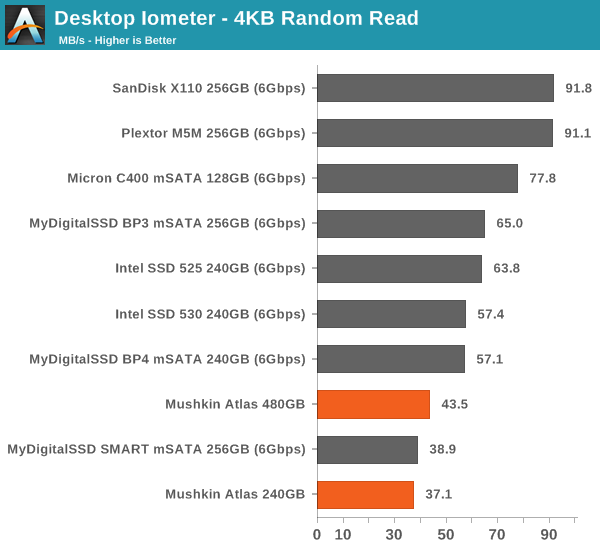
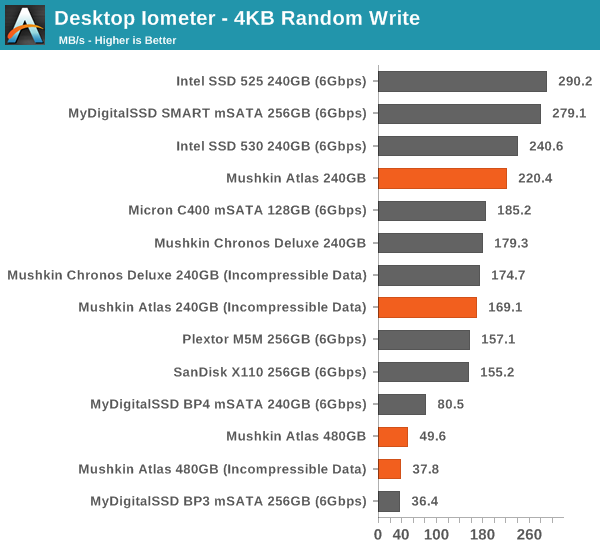
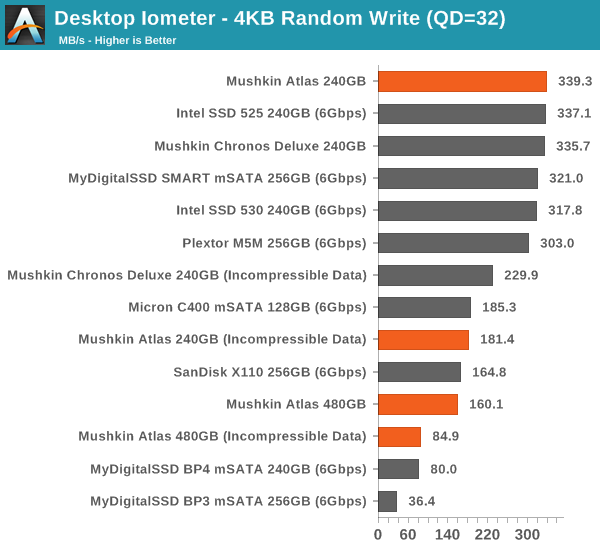
At 240GB, random write speeds are normal to SF-2281 but the 480GB model is noticeably slower. This isn't exceptional because the 480GB Vertex 3 (the only other 480GB SF-2281 SSD we've tested) exhibited similar behavior, although its performance was slightly better. I think the drop in performance has to do with raw processing power because when you double the capacity, the amount of pages/blocks that need to be tracked doubles as well. Newer controllers (like Marvell 88SS9187 and Samsung MDX) have no trouble tracking more pages/blocks but the SF-2281 design is over two years old, which is definitely showing up.
Sequential Read/Write Speed
To measure sequential performance I ran a 1 minute long 128KB sequential test over the entire span of the drive at a queue depth of 1. The results reported are in average MB/s over the entire test length.
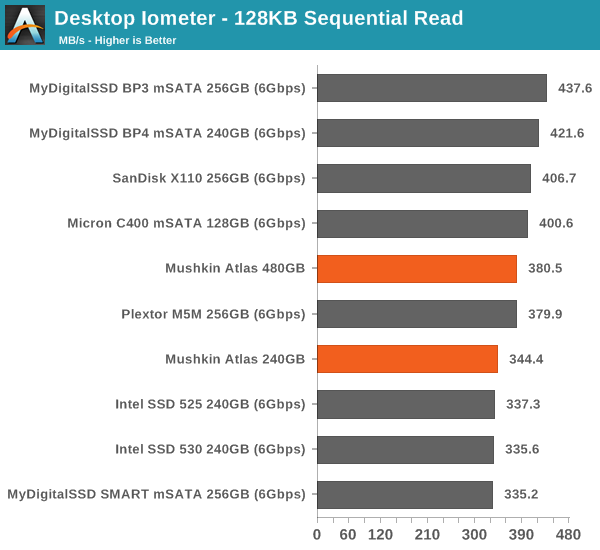
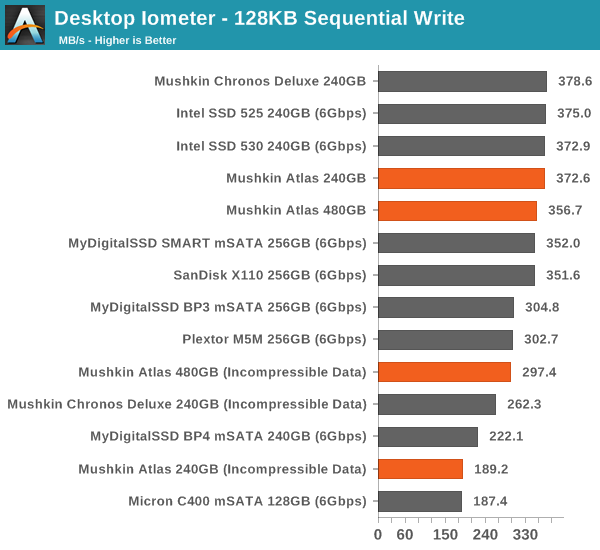
Sequential performance is average. When moving to incompressible data performance drops (as always) and especially the 240GB model experiences quite a big drop.
AS-SSD Incompressible Sequential Read/Write Performance
The AS-SSD sequential benchmark uses incompressible data for all of its transfers. The result is a pretty big reduction in sequential write speed on SandForce based controllers.
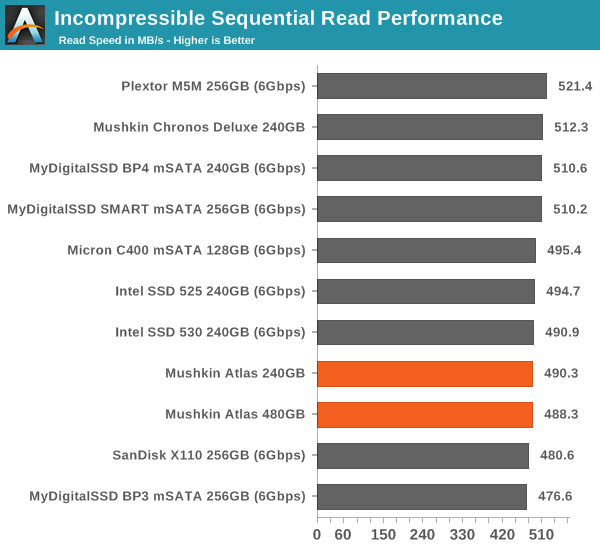
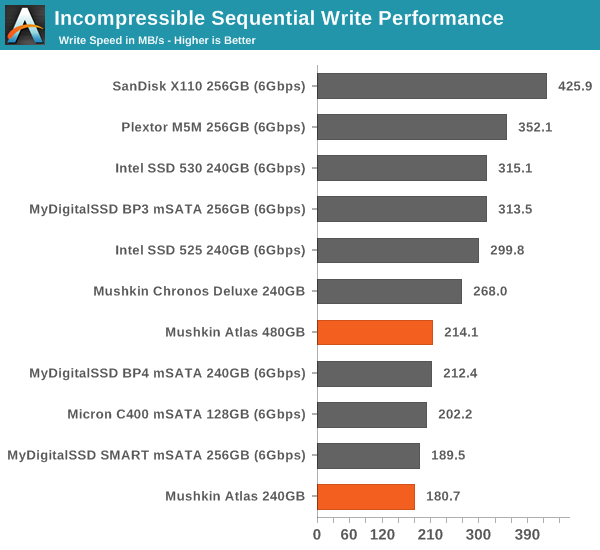










27 Comments
View All Comments
kwrzesien - Monday, December 16, 2013 - link
Avago to buy storage chipmaker LSI for $6.6 billion:http://www.cnbc.com/id/101275289
MichalSuchyn - Monday, December 16, 2013 - link
Love my job, since I've been bringing in $5600… I sit at home, music playing while I work in front of my new iMac that I got now that I'm making it online(Click on menu Home)http://goo.gl/O9CyBB
CharonPDX - Tuesday, December 17, 2013 - link
Spammer seems to be on the increase here - is there any easy way to report spam comments? (I can't find one.)hojnikb - Monday, December 16, 2013 - link
Yey another sandforce drive -.-Although one interesting point comes from all this...
Sandforce is actually working on fixing trim, which is nice to hear.
Gunbuster - Monday, December 16, 2013 - link
I've got a 240GB Mushkin MSATA in my Precision M4700. Runs like a champ.jrs77 - Monday, December 16, 2013 - link
mSATA is only of interest when talking either about switching storage in your ultrabook or your thin mITX system. For everything else a standard SATA SSD is better in price/performance.And for those ultrabooks or thin-clients performance isn't the first question, but price and silent operation.
So I'd say that this drive pretty much looses on all fronts, especially vs the Cruicial M500 240GB which is available currently for $144.99.
lmcd - Monday, December 16, 2013 - link
Or when talking about the mSATA in a larger notebook as the boot drive.MrSpadge - Tuesday, December 17, 2013 - link
I disagree: outfitting a regular laptop with one mSATA baby and a 1 or 2 TB 9.5mm height 2.5" HDD could be very welcome to power users not wanting 17" laptops with 2 drive bays. But of course these mSATA drives have to be priced competitively - there's no reason for them to cost more capacity.Hrel - Monday, December 16, 2013 - link
Plextor still seems to be the way to go here. Good to see Mushkin offering a legitimate alternative, but Plextor gets my recommendation for now.whyso - Monday, December 16, 2013 - link
Pretty poor drive. The high power consumption kills it in the mobile space.